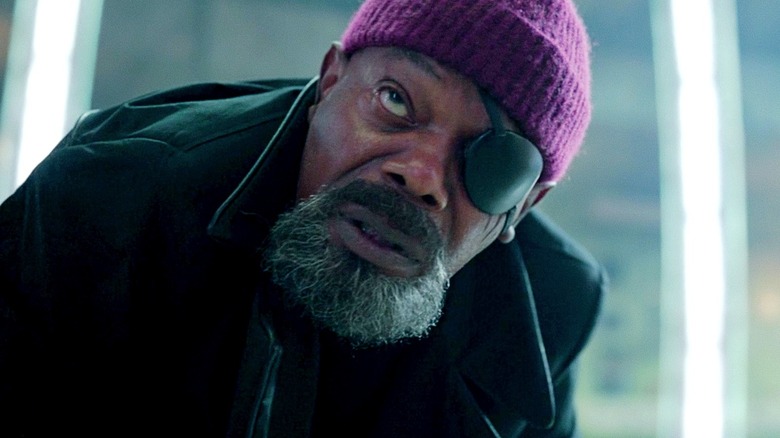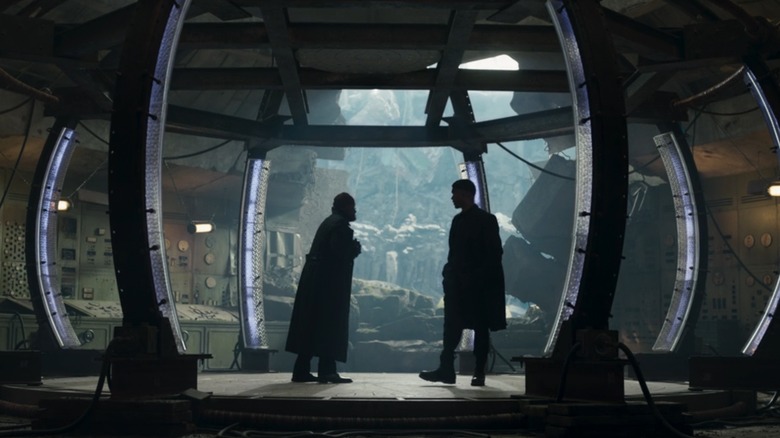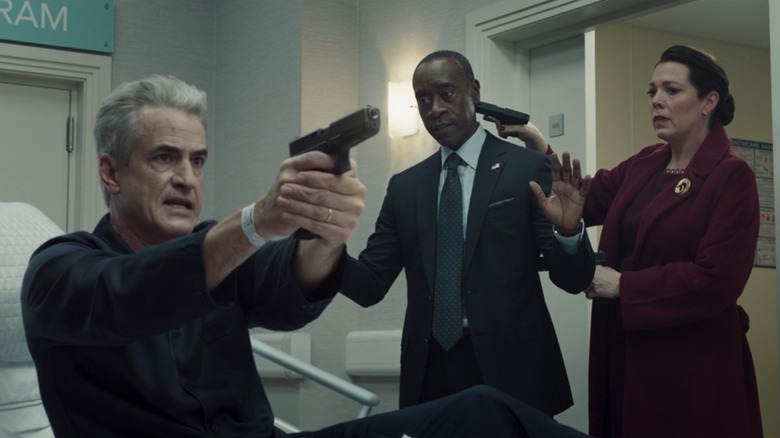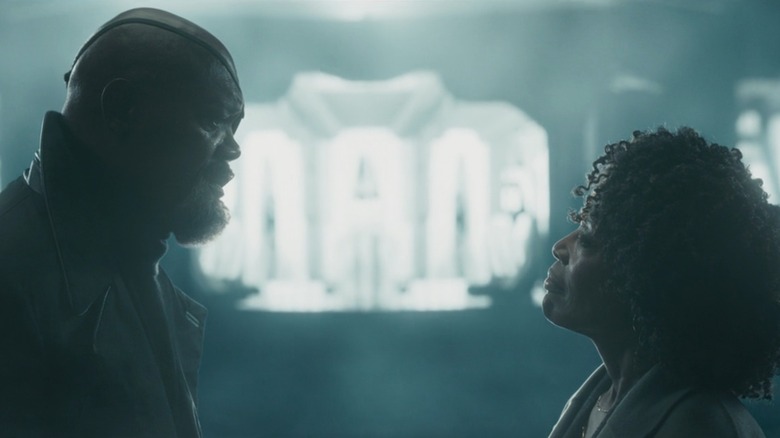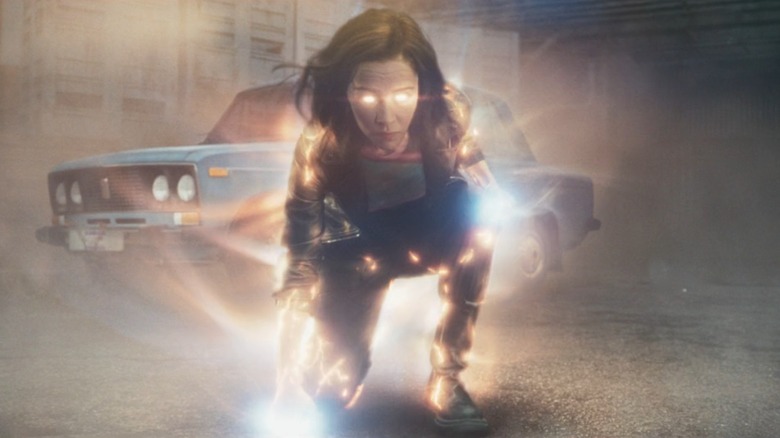Secret Invasion Finale: Marvel's Most Underwhelming Series Ends With A Whimper
This article contains spoilers for the series finale of "Secret Invasion."
That's ... it?
In retrospect, I'm not sure there was really any other way a show as underhyped and underwhelming as "Secret Invasion" would come to a conclusion, despite common sense and comic books telling us that this story really should've amounted to much, much more than what we ultimately got. From the beginning, Marvel's latest Disney+ offering came with the implicit promise of paranoia thriller trappings, political intrigue, and all the potential in the world to take the classic sci-fi concept of enemies hiding among us in plain sight and put a superhero spin on it. But the forgettable series we received instead only served as a reminder that, much like Nick Fury himself, the Marvel Cinematic Universe has clearly lost a step since blasting right past its most logical stopping point, "Avengers: Endgame," and forging ahead in perpetuity with nary a break.
Maybe "Secret Invasion" should've taken a hint from its own main character. As much as Samuel L. Jackson has consistently brought it throughout his sporadic appearances in the MCU and relished the opportunity to give Fury much more of an inner life than he's ever received in the movies, the show began by shining a spotlight on how washed-up and irrelevant the former SHIELD director now was in a world that had moved beyond him. That's easily the most compelling material the legendary actor has had to work with in this franchise since 2008, but to what end? After weeks of building up some sort of dramatic, game-changing conclusion, the finale breezes through its main storyline (the 38-minute runtime, the last five minutes of which are the ending credits, ranks among the shortest episodes of the entire season) with a series of anticlimactic denouements. And given how shockingly little Fury actually factors into the episode, I'm not entirely sure what point this series was trying to make about him.
What we're left with is, unfortunately, a bizarrely sedate and painfully by-the-numbers finale that ends with hardly even a whimper.
A homecoming ... of sorts
Ah, yes, the confrontation we've all been waiting for! Or is it? After last week's episode ended by teasing the upcoming final battle between Fury and Gravik (Kingsley Ben-Adir), the payoff to this long-simmering rivalry ... doesn't even end up involving Fury at all. In fact, we get absolutely zero resolution to what had consistently been billed as the show's central conflict.
We spend fully half the episode (credited to Kyle Bradstreet and Brian Tucker and directed by Ali Selim) following what we assume to be Fury marching headlong into Gravik's headquarters in Russia, which is under imminent threat of nuclear attack by the United States as retribution for the attack on the President's motorcade. Armed with a vial containing the DNA of Carol Danvers and the rest of the Avengers, Fury seeks to make a deal with his former compatriot: take all of those superpowers and leave Earth for some other planet entirely. Condemning another species to death at the hands of the Skrull extremists is a cold proposition, even by Fury's standards, but Gravik has no interest in leaving and starting anew someplace else. Not when he has his enemy right where he wants him.
To his credit, Ben-Adir brings all the pent-up, juvenile rage he can muster as the Skrull impotently lashes out at his mentor for abandoning his people all those years ago. This unforgivable grudge has driven all of Gravik's actions since the beginning of "Secret Invasion" and one would think that, for the sake of satisfying drama, both characters would have to directly confront this impasse. But after Fury is weakened by prolonged exposure to the radiation in the reactor and Gravik takes advantage by turning on the Super Skrull machine, the finale hits us with the first of its many questionable choices: revealing that it was Emilia Clarke's G'iah in disguise the whole time, now armed with all the same Avengers-level powers that Gravik is.
From one extreme to the other, the episode jumps from their lethargically-staged shouting match right into the awfully overused trope of another boring, VFX-heavy punch-fest.
The trouble with Skrulls
Meanwhile, the other main storyline in the finale revolves around Don Cheadle's Rhodey (whom we know to be a Skrull in disguise) and his attempts to instigate World War III by manipulating President Ritson (Dermot Mulroney). Still holed up in the hospital after the attack on the caravan that claimed the life of Talos, Rhodey and the president soon find themselves held at gunpoint by Sonya Falsworth (Olivia Colman) and the real Nick Fury. Maddeningly enough, the two unconventional allies waste precious minutes trying to convince the President of Rhodey's Skrull impersonator instead of just, I don't know, shooting his pinky finger off to reveal his Skrull form – which has been established multiple times before as a foolproof method to figure out if a human is really a Skrull!
Instead, this wheel-spinning sequence ends with Rhodey shot dead while attempting to break free, revealing that he was, in fact, a shapeshifter while the President is finally convinced to call off his attack.
Back in Russia, the MCU proves that it only knows two ways for heroes and villains to work out their issues: yelling loudly while restating information they already know about each other, and punching each other in the face during weightless fights with absolutely no tension to them whatsoever. The battle between Gravik and G'iah feels particularly ineffective, thanks to the rather obvious constraints of a Disney+ budget and the far-too-busy (and frankly bizarre) visual choice to have both Super-Skrulls literally morph into whatever random MCU character that they happen to be channeling their powers from. But even this ends much too abruptly, with G'iah killing Gravik unceremoniously and subsequently saving all the humans who were being kept prisoner as their Skrull replicators wreaked havoc on the world's geopolitical stage.
And just like that, the entire Skrull threat is averted as neatly and tidily as possible. It's a disappointingly easy way out for a series that constantly played up the unique difficulty of repelling a literal invasion of aliens, to say the least. But at least "Secret Invasion" wouldn't then gloss over multiple massive developments in the painfully short amount of time left in the episode ... right?
Making an exit
If you've spent the last six weeks wondering how "Secret Invasion" would manage to resolve all the loose ends of its globe-spanning plot, well, the answer was apparently, "Find out next time on the MCU!"
The series of scenes that bring the main A-plot to a close includes the President basically declaring war on all aliens on Earth (RIP New Asgard, I guess!), Fury and a tragically sidelined Priscilla (Charlayne Woodard) saying their last goodbyes to one another in the home that Fury regretfully never spent enough time in, and G'iah and Sonya entering into some vague alliance (with the former needing startlingly little persuasion to accept this offer from a woman she hasn't even met before) to help both of their respective species coexist. Oh, and we learn through an offhand comment from Fury and a quick montage that the President's hate speech apparently incited an all-out war as vigilante humans randomly murder any public figure they assume might be a Skrull. That's definitely not something that would've been worth exploring any earlier in this show, I guess!
All of this is left for some other future installment of the MCU to deal with, including the bombshell at the very end that the infamous Kree are ready to make peace with their longtime Skrull enemies, apparently. Why? How? When? It doesn't matter, except that this will probably be addressed in some way in the upcoming movie "The Marvels." We end with Fury asking his wife to help with the impending peace summit and work as the official Skrull diplomat, as both share a passionate kiss and reaffirm their love before boarding the spaceship that first brought Fury back to Earth. As sweet as this final scene is, it can't help but feel overshadowed by a series that struggled every step of the way to justify its own existence. In the end, I'm not sure it ever really did.
Stray thoughts
- Artificial Unintelligence: As much as the Marvel franchise has prided itself on dominating the pop culture conversation every time a new movie or show released, there's a certain irony to the idea that the most headlines "Secret Invasion" ever drummed up was widespread outrage over its use of artificial intelligence in the opening credits sequence. That's been an especially bad look during the dual SAG-AFTRA and WGA strikes currently ongoing and it's still worth criticizing, even now.
- Just One More Question... So when Fury (really G'iah) acknowledges that he knew "within a few years of searching" that no other planet would ever be suitable for the Skrulls, it felt like the writers attempting to explain the rather popular "plot hole" complaint that the entire series could've been avoided by relocating the Skrulls to literally any other place in the universe. Admittedly, that's a pretty wild claim to pass by without any further explanation, given how many aliens exist in the MCU and how many habitable planets there would seem to be in the Marvel universe. But I guess this could've also been G'iah just making things up, which only further highlights the hollowness of pulling the rug out from what should've been Fury and Gravik's last conversation for the sake of the G'iah reveal.
- Agents of Chaos: Alright, I admit I have no idea why this was even a thing, but apparently the social media chatter for several weeks now has been that Chloe Bennet's Daisy Johnson and/or Ming-Na Wen's Melinda May from ABC's "Agents of SHIELD" series would show up in "Secret Invasion" for some reason. That ... didn't happen, obviously, but for those of you who held out hope for it anyway have, please accept my condolences.
